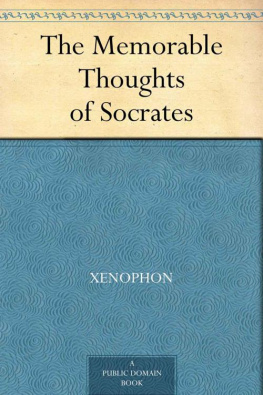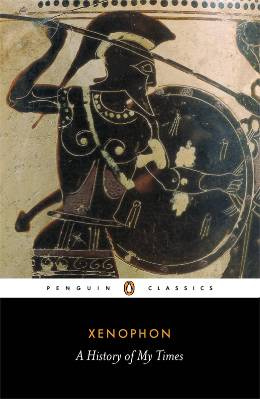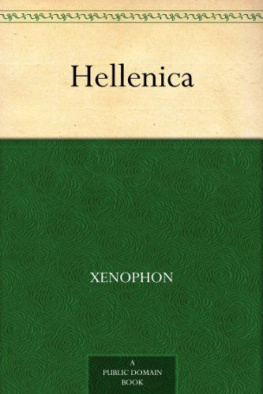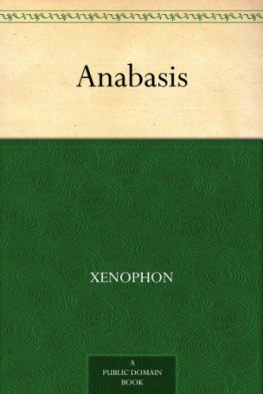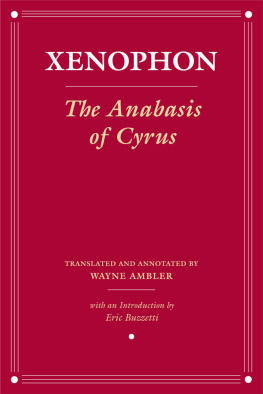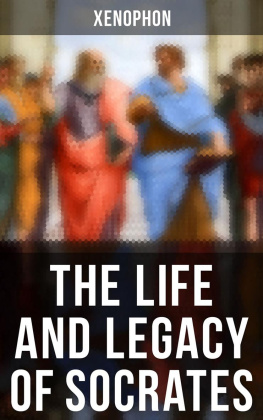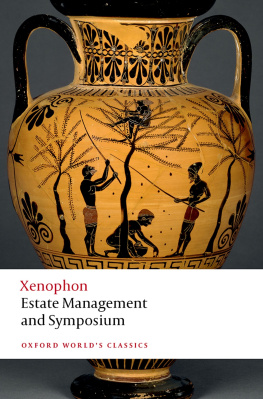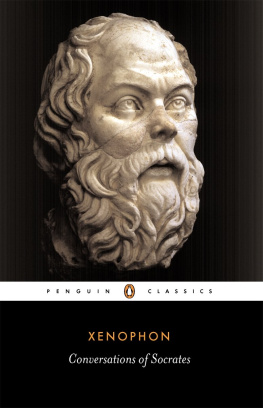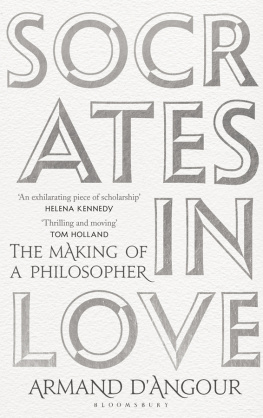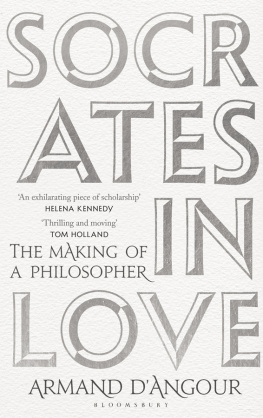Xenophon - The Memorable Thoughts of Socrates
Here you can read online Xenophon - The Memorable Thoughts of Socrates full text of the book (entire story) in english for free. Download pdf and epub, get meaning, cover and reviews about this ebook. year: 2012, genre: Science. Description of the work, (preface) as well as reviews are available. Best literature library LitArk.com created for fans of good reading and offers a wide selection of genres:
Romance novel
Science fiction
Adventure
Detective
Science
History
Home and family
Prose
Art
Politics
Computer
Non-fiction
Religion
Business
Children
Humor
Choose a favorite category and find really read worthwhile books. Enjoy immersion in the world of imagination, feel the emotions of the characters or learn something new for yourself, make an fascinating discovery.
The Memorable Thoughts of Socrates: summary, description and annotation
We offer to read an annotation, description, summary or preface (depends on what the author of the book "The Memorable Thoughts of Socrates" wrote himself). If you haven't found the necessary information about the book — write in the comments, we will try to find it.
The Memorable Thoughts of Socrates — read online for free the complete book (whole text) full work
Below is the text of the book, divided by pages. System saving the place of the last page read, allows you to conveniently read the book "The Memorable Thoughts of Socrates" online for free, without having to search again every time where you left off. Put a bookmark, and you can go to the page where you finished reading at any time.
Font size:
Interval:
Bookmark:
Transcribed from the 1889 Cassell & Company edition by David Price, email ccx074@coventry.ac.uk
BY XENOPHON.
TRANSLATED BY EDWARD BYSSHE.
CASSELL & COMPANY, Limited :
LONDON, PARIS, NEW YORK & MELBOURNE.
1888.
This translation of Xenophons Memorabilia of Socrates was first published in 1712, and is here printed from the revised edition of 1722. Its author was Edward Bysshe, who had produced in 1702 The Art of English Poetry, a well-known work that was near its fifth edition when its author published his translation of the Memorabilia. This was a translation that remained in good repute. There was another edition of it in 1758. Bysshe translated the title of the book into The Memorable Things of Socrates. I have changed Things into Thoughts, for whether they be sayings or doings, the words and deeds of a wise man are alike expressions of his thought.
Xenophon is said to have been, when young, a pupil of Socrates. Two authorities have recorded that in the flight from the battle of Delium in the year b.c. 424, when Xenophon fell from his horse, Socrates picked him up and carried him on his back for a considerable distance. The time of Xenophons death is not known, but he was alive sixty-seven years after the battle of Delium.
When Cyrus the Younger was preparing war against his brother Artaxerxes Mnemon, King of Persia, Xenophon went with him. After the death of Cyrus on the plains of Cunaxa, the barbarian auxiliaries fled, and the Greeks were left to return as they could from the far region between the Tigris and Euphrates. Xenophon had to take part in the conduct of the retreat, and tells the story of it in his Anabasis, a history of the expedition of the younger Cyrus and of the retreat of the Greeks. His return into Greece was in the year of the death of Socrates, b.c. 399, but his association was now with the Spartans, with whom he fought, b.c. 394, at Coroneia. Afterwards he settled, and lived for about twenty years, at Scillus in Eleia with his wife and children. At Scillus he wrote probably his Anabasis and some other of his books. At last he was driven out by the Eleans. In the battle of Mantineia the Spartans and Athenians fought as allies, and Xenophons two sons were in the battle; he had sent them to Athens as fellow-combatants from Sparta. His banishment from Athens was repealed by change of times, but it does not appear that he returned to Athens. He is said to have lived, and perhaps died, at Corinth, after he had been driven from his home at Scillus.
Xenophon was a philosophic man of action. He could make his value felt in a council of war, take part in battleone of his books is on the duties of a commander of cavalryand show himself good sportsman in the hunting-field. He wrote a book upon the horse; a treatise also upon dogs and hunting. He believed in God, thought earnestly about social and political duties, and preferred Spartan institutions to those of Athens. He wrote a life of his friend Agesilaus II., King of Sparta. He found exercise for his energetic mind in writing many books. In writing he was clear and to the point; his practical mind made his work interesting. His Anabasis is a true story as delightful as a fiction; his Cyropdia is a fiction full of truths. He wrote Hellenica, that carried on the history of Greece from the point at which Thucydides closed his history until the battle of Mantineia. He wrote a dialogue between Hiero and Simonides upon the position of a king, and dealt with the administration of the little realm of a mans household in his conomicus, a dialogue between Socrates and Critobulus, which includes the praise of agriculture. He wrote also, like Plato, a symposium, in which philosophers over their wine reason of love and friendship, and he paints the character of Socrates.
But his best memorial of his old guide, philosopher, and friend is this work, in which Xenophon brought together in simple and direct form the views of life that had been made clear to himself by the teaching of Socrates. Xenophon is throughout opposing a plain tale to the false accusations against Socrates. He does not idealise, but he feels strongly, and he shows clearly the worth of the wisdom that touches at every point the actual conduct of the lives of men.
H. M.
I have often wondered by what show of argument the accusers of Socrates could persuade the Athenians he had forfeited his life to the State. For though the crimes laid unto his charge were indeed greatThat he did not acknowledge the gods of the Republic; that he introduced new onesand, farther, had debauched the youth; yet none of these could, in the least, be proved against him.
For, as to the first, That he did not worship the deities which the Republic adored, how could this be made out against him, since, instead of paying no homage to the gods of his country, he was frequently seen to assist in sacrificing to them, both in his own family and in the public temples?perpetually worshipping them in the most public, solemn, and religious manner.
What, in my opinion, gave his accusers a specious pretext for alleging against him that he introduced new deities was thisthat he had frequently declared in public he had received counsel from a divine voice, which he called his Demon. But this was no proof at all of the matter. All that Socrates advanced about his demon was no more than what is daily advanced by those who believe in and practise divination; and if Socrates, because he said he received intelligence from his genius, must be accused of introducing new divinities, so also must they; for is it not certain that those who believe in divination, and practise that belief, do observe the flight of birds, consult the entrails of victims, and remark even unexpected words and accidental occurrences? But they do not, therefore, believe that either the birds whose flight they observe or the persons they meet accidentally know either their good or ill fortuneneither did Socratesthey only believe that the gods make use of these things to presage the future; and such, too, was the belief of Socrates. The vulgar, indeed, imagine it to be the very birds and things which present themselves to them that excite them to what is good for them, or make them avoid what may hurt them; but, as for Socrates, he freely owned that a demon was his monitor; and he frequently told his friends beforehand what they should do, or not do, according to the instructions he had received from his demon; and they who believed him, and followed his advice, always found advantage by it; as, on the contrary, they who neglected his admonitions, never failed to repent their incredulity. Now, it cannot be denied but that he ought to have taken care not to pass with his friends either for a liar or a visionary; and yet how could he avoid incurring that censure if the events had not justified the truth of the things he pretended were revealed to him? It is, therefore, manifest that he would not have spoken of things to come if he had not believed he said true; but how could he believe he said true, unless he believed that the gods, who alone ought to be trusted for the knowledge of things to come, gave him notice of them? and, if he believed they did so, how can it be said that he acknowledged no gods?
He likewise advised his friends to do, in the best manner they could, the things that of necessity they were to do; but, as to those whose events were doubtful, he sent them to the oracles to know whether they should engage in them or not. And he thought that they who design to govern with success their families or whole cities had great need of receiving instructions by the help of divinations; for though he indeed held that every man may make choice of the condition of life in which he desires to live, and that, by his industry, he may render himself excellent in it, whether he apply himself to architecture or to agriculture, whether he throw himself into politics or economy, whether he engage himself in the public revenues or in the army, yet that in all these things the gods have reserved to themselves the most important events, into which men of themselves can in no wise penetrate. Thus he who makes a fine plantation of trees, knows not who shall gather the fruit; he who builds a house cannot tell who shall inhabit it; a general is not certain that he shall be successful in his command, nor a Minister of State in his ministry; he who marries a beautiful woman in hopes of being happy with her knows not but that even she herself may be the cause of all his uneasinesses; and he who enters into a grand alliance is uncertain whether they with whom he allies himself will not at length be the cause of his ruin. This made him frequently say that it is a great folly to imagine there is not a Divine Providence that presides over these things, and that they can in the least depend on human prudence. He likewise held it to be a weakness to importune the gods with questions which we may resolve ourselves; as if we should ask them whether it be better to take a coachman who knows how to drive than one who knows nothing of the matter? whether it be more eligible to take an experienced pilot than one that is ignorant? In a word, he counted it a kind of impiety to consult the oracles concerning what might be numbered or weighed, because we ought to learn the things which the gods have been pleased to capacitate us to know; but that we ought to have recourse to the oracles to be instructed in those that surpass our knowledge, because the gods are wont to discover them to such men as have rendered them propitious to themselves.
Font size:
Interval:
Bookmark:
Similar books «The Memorable Thoughts of Socrates»
Look at similar books to The Memorable Thoughts of Socrates. We have selected literature similar in name and meaning in the hope of providing readers with more options to find new, interesting, not yet read works.
Discussion, reviews of the book The Memorable Thoughts of Socrates and just readers' own opinions. Leave your comments, write what you think about the work, its meaning or the main characters. Specify what exactly you liked and what you didn't like, and why you think so.

